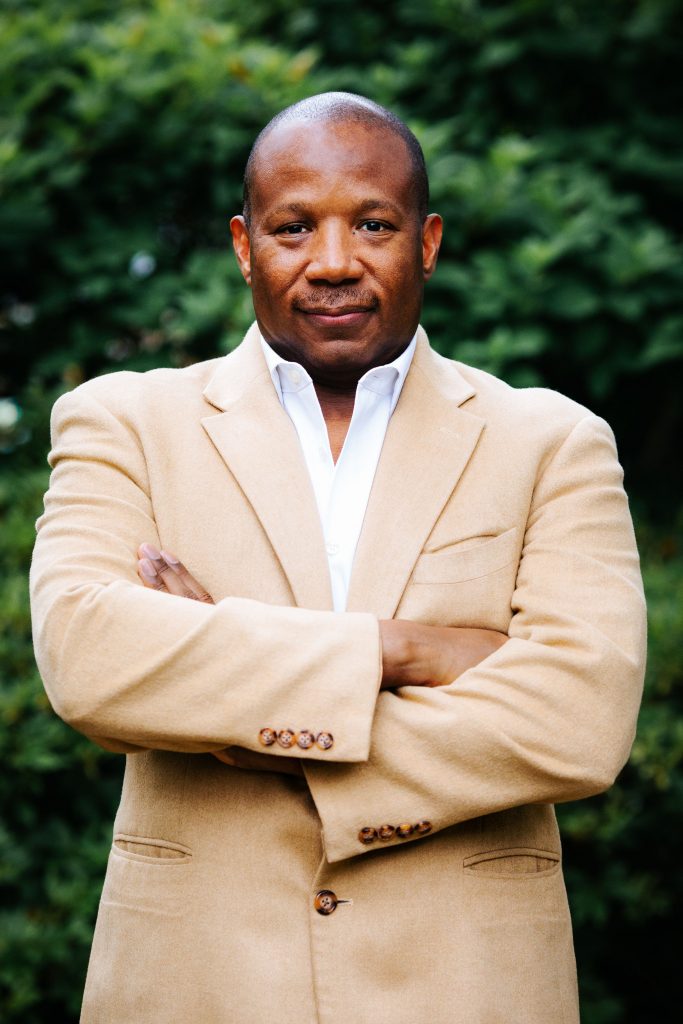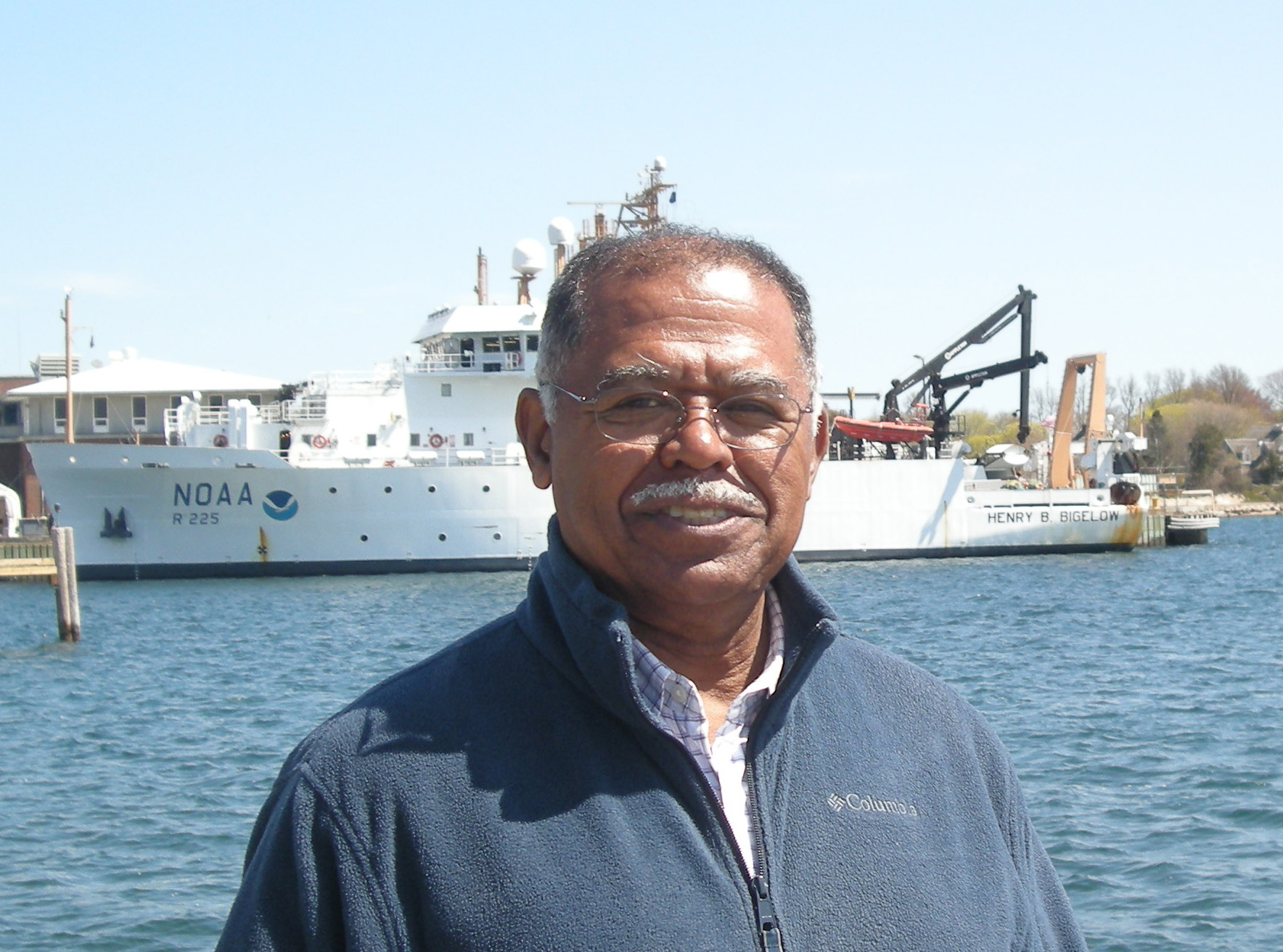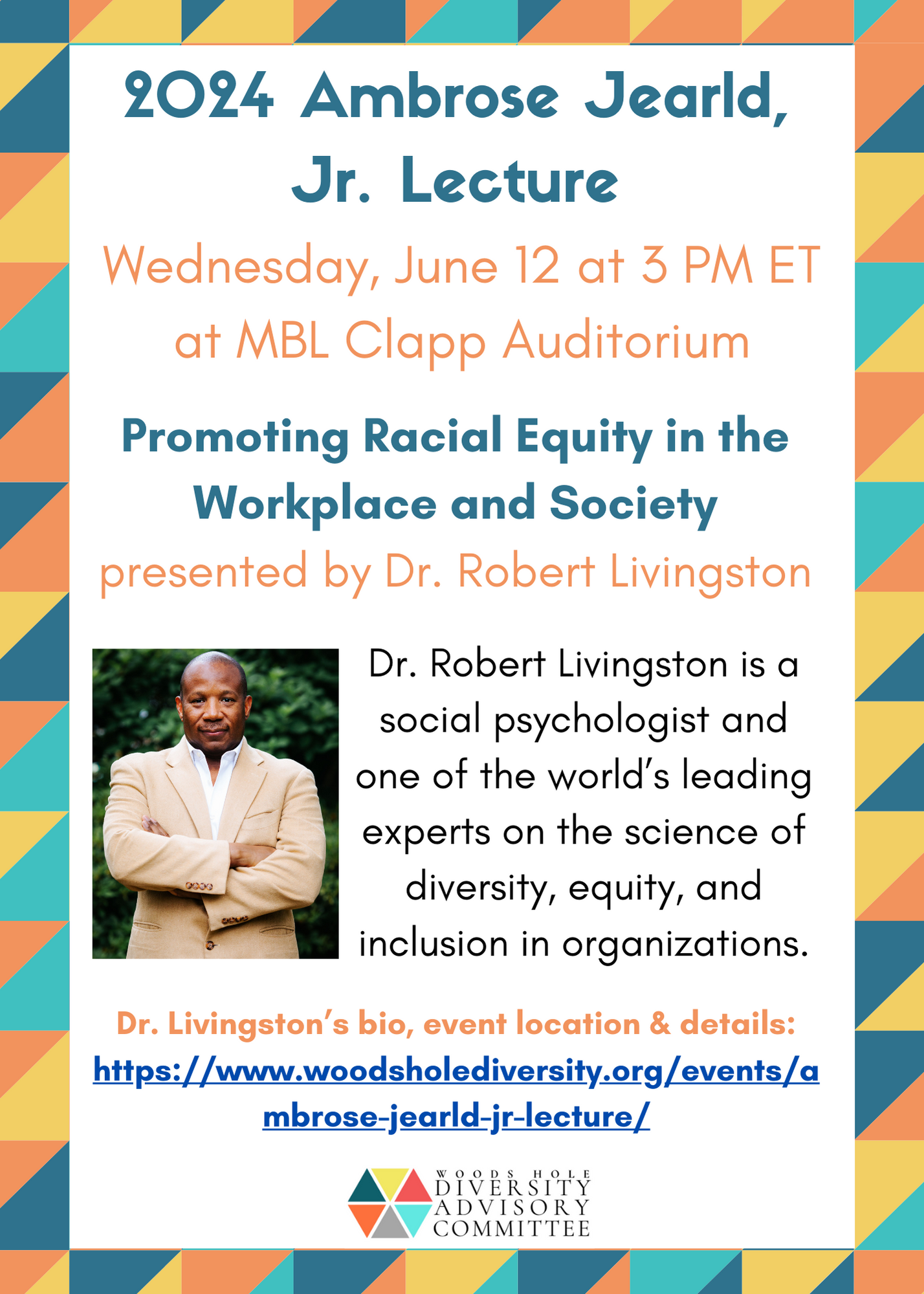Ambrose Jearld, Jr. Lecture
The Ambrose Jearld, Jr. Lecture is given every summer in Woods Hole by invited scholars, scientists, authors and others who can challenge the status quo to bring perspective, knowledge and expertise to the subject of building a more diverse and inclusive community. The first Ambrose Jearld Jr. Lecture on Diversity and Inclusion lecture was presented in July 2017 by David J. Asai, senior director of science education at the Howard Hughes Medical Institute (HHMI), on “Inclusive Excellence in Science: Race Matters”.
Dr. Jearld devoted much of his career to fostering NOAA's goal of maintaining a workplace in which all people are respected as individuals and valued for their contributions. His work with NOAA, higher education institutions (especially Historically Black Colleges and Universities and other Minority Serving Institutions) has helped make oceanography and marine biology more accessible to a diverse body of students and research faculty.
The lecture is a product of the Woods Hole Diversity Initiative and the Woods Hole Diversity Advisory Committee.
The 2024 Ambrose Jearld, Jr. Lecture will be held on Wednesday June 12 from 3-4:15PM in the Clapp Auditorium - 7 MBL St., inside the Lillie building.
Note: This lecture will be in-person only (no Zoom or recording). Information about parking is on this page, below Dr. Livingston's biography
"Promoting Racial Equity in the Workplace and Society"
Presented by
Dr. Robert Livingston, a social psychologist and one of the world’s leading experts on the science of diversity, equity, and inclusion in organizations.

Dr. Robert Livingston is a social psychologist and one of the world’s leading experts on the science of diversity, equity, and inclusion in organizations. Prior to joining Harvard in 2015, he held faculty positions at the University of Wisconsin-Madison, the Kellogg School of Management, and the University of Sussex in England, where he was also department chair and faculty director of the Centre for Leadership, Ethics, and Diversity (LEAD).
His 20+ years of scientific research have been published in top-tier academic journals and have also been featured in popular press outlets such as the New York Times, Wall Street Journal, Financial Times, BBC, Newsweek, USA Today, Time, MSNBC, and Harvard Business Review.
His Harvard Business Review article “How to Promote Racial Equity in the Workplace” was the winner of the 2020 Warren Bennis Prize, awarded to the best article on leadership published in HBR each year. This article was also showcased in HBR at 100—a book containing the most influential articles published in Harvard Business Review over the last 100 years.
His highly acclaimed and bestselling book The Conversation was selected as a Financial Times Best Book of 2021, and was also nominated for a 2022 NAACP Image Award for “Outstanding Literary Work” in nonfiction.
In recognition of his academic achievement and social impact, he was awarded an honorary doctorate from Cambridge College in June 2022. That same year he was also elected as a Fellow of the Society for Personality and Social Psychology, an honor bestowed upon “individuals who have made extraordinary and unique contributions to the field of personality and social psychology.”
In his spare time, he enjoys jazz, wine and whiskey tasting, gastronomy, philosophy, cinema, interior design, and nature documentaries. He has resided in six countries and speaks four languages.
Parking options for the 2024 Jearld Lecture:
- Limited, paid street parking in Woods Hole along Water St., MBL St., North St., Albatross St. or Railroad Ave.
- Free parking at the NOAA Cottage Lot on Albatross Street. (No parking in the NOAA lot on Water St)
- Park at SEA and shuttle to MBL
- Park at Sea Education Association (171 Woods Hole Rd) and shuttle down to MBL at 2:15. Return from MBL to SEA at 4:15
- There is limited space and capacity, so we ask that you email us to reserve your space on the shuttle by Monday, June 10 at woodsholedac@gmail.com
We also encourage people to carpool or ride their bikes!
More options will be listed as they are confirmed.


Articles highlighting the work, contributions, and legacy of Dr. Ambrose Jearld, Jr.
- Black History Month Blog Series 2020: Ambrose Jearld Jr.
- Envisioning diversity in science with Dr. Ambrose Jearld
- Ambrose Jearld Named to Inaugural Class of American Fisheries Society Fellows
Previous lectures
2023
"New Scientists for A New America in A New Normal"
Dr. Orlando Taylor, Executive Director and Co-PI of the Center for the Advancement of STEM Leadership at Fielding Graduate University in Santa Barbara, CA
2022
"New Scientists for A New America in A New Normal"
Dr. Orlando Taylor, Executive Director and Co-PI of the Center for the Advancement of STEM Leadership at Fielding Graduate University in Santa Barbara, CA
2021
"Collectors, Nightlights and Allies, Oh My! Building Strong Cross-racial Mentoring Relationships"
Dr. Marisela Martinez-Cola, Associate Professor at Morehouse College
2020
"Reducing Harm: A politic to address institutional and cultural practices that reduce participation and retention in STEM"
Nigel Golden, PhD Candidate at the University of Massachusetts Amherst
Followed by the presentation of the John K. Bullard Award to Dr. Larry Alade, NOAA Fisheries.
2019
"A Life of Climate Modeling and Promoting Diversity"
Warren Washington, Senior Scientist at the National Center for Academic Research (NCAR)
2018
“Strategies for Facilitating and Supporting a Diverse Geoscience Talent Pool and Workforce: Lessons Learned”
Ashanti Johnson, Executive Director of the MS PHD’S Professional Development and Mentoring Institute, and as the CEO/Superintendent of Cirrus Academy
2017 (Inaugural)
"Inclusive Excellence in Science: Race Matters”
David J. Asai, senior director of science education at the Howard Hughes Medical Institute (HHMI)
